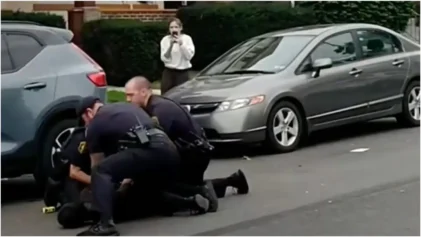A nine-figure lawsuit has been filed against the city of New Haven, Connecticut, claiming city police neglected to properly secure a handcuffed Black man in the back of their patrol van after arresting him. As a result of what his lawyers contend was an avoidable accident, the man has been permanently paralyzed.
On Tuesday, Sept. 27, a lawsuit obtained by Atlanta Black Star was filed by Wallingford-based attorneys R.J. Weber III and Lou Rubano with the United States District Court District of Connecticut against the City of New Haven, Officer Oscar Diaz, Officer Betsy Segui, Officer Ronald Pressley, Officer Jocelyn Lavandier and Officer Luis Rivera, alleging they deprived the plaintiff Richard “Randy” Cox of his constitutionally bound civil rights on June 19 when they “jointly and in concert with each other” and “failed and refused” to protect him while he was in their custody.
Cox, 36, is suing for $100 million, claiming negligence, recklessness, excessive force, the denial of medical treatment, intentional infliction of emotional distress, assault, and battery from each officer.
The 29-page lawsuit details that after members of the New Haven Police Department arrested him and placed him in handcuffs, they put him “in a police cruiser for transport to the Westchester Avenue substation” but did not strap him in.
“While en route to the detention center, Diaz suddenly and without warning applied his brakes resulting in the sudden stop of the transport van,” it read. “Cox had no warning of the impending and sudden stop resulting in his body being violently thrown around the inside of the transport van resulting in serious and permanent injuries.”
Diaz, the driver of a prisoner conveyance van, slammed on the brakes in an effort to avoid crashing into another vehicle at the intersection of Division and Mansfield Streets, causing Cox to fall into the van’s back wall and injure his neck and spine.
According to his own bodycam footage, Diaz was speeding, driving 11 miles over the 25-mph speed limit.
Diaz goes to the back and asks what happened and later calls for help. However, instead of asking for the emergency medics to come to the scene, he continues his trip to the detention center at 1 Union Ave. He drove past two hospitals on his way to the jail.
Once there, Diaz still does not wait for the ambulance but proceeds to lock Cox up and claim Cox is lying about being hurt. No one checked but thought he was drunk.
Officers demanded Cox stand up and then yanked him out of the van. They at one point placed him in a wheelchair, and then once he was in jail, dragged him across the floor of his cell.
Bodycam captures one officer saying to another, “He’s perfectly fine. Want me to put these [handcuffs] on him?” He wasn’t fine. Cox had broken his neck.
The end of the video shows the cop cuffing Cox’s ankles, leaving him on the floor, before locking the door of the cell.
Civil Rights attorney Benjamin Crump has been hired to represent Cox and his family and joined Weber and Rubano, Cox’s mom Doreen Coleman and sister Latoya Boomer, state NAACP President Scot X. Esdaile and local chapter President Dori Dumas, other civil rights leaders, and Cox’s supporters in front of New Haven’s City Hall to talk about the lawsuit.
According to the Huffington Post, he said at the Tuesday night news conference in New Haven, “Can you imagine what it is like trying to get him here and to the hospital now?”
“Can you imagine what they have to go through?” he continued. “He is a human being. Look at the humanity in him. We have a tradition in America of discounting people of color, marginalizing their value.”
Since the incident, Cox has been in and out of the hospital, sometimes living with breathing tubes, and has had to shift his life. Now, his family is taking care of him. An estimate for his future care that ensures a “basic quality of life,” Crump believes will run between $20 million to $30 million.
“We think there is no value that can replace the damages and the hurt and the harm and the mental anguish and the, just, torture that he’s endured every day, every hour, every minute, every second,” Crump said.
“It does seek damages in the amount of $100 million,” Weber said, adding, “There is no amount of money in damages that can compensate this man for the injuries that he sustained, for the injuries that he suffered.”
His mother said justice is the goal of the lawsuit, saying at the news conference, “I want justice for my son. He cannot do anything for himself, and I am the one that is here most of the time helping him drink and helping eat food.”
The belief is that the severity of Cox’s condition could have been limited, but because of the five officers on the scene’s blatant disregard for the then-suspect, his injuries went untreated for hours.
That night Cox sustained severe injuries to his neck and spine. The lawsuit states, “As a direct and proximate result of the aforesaid actions of the defendants, Cox has suffered and continues to suffer great physical and emotional pain, including but not limited to mental anguish, frustration, and anxiety over the fact that he was and remains seriously injured.”
From their alleged negligence to their alleged use of excessive force, that Crump argues is captured on police bodycam, the plaintiff aims to show the officers’ actions were “intentional, willful and deliberate.”
The city of New Haven released six bodycam videos from the incident. One video shows Cox sitting in the van, not fastened in, and the very moment Diaz abruptly stops the van.
A handcuffed Cox, in one of the videos, slides down the bench and crashes headfirst into the back door and the van and weakly cries out, “Help.”
The complaint states, “Cox has suffered and continues to suffer great physical and emotional pain, including but not limited to mental anguish, frustration, and anxiety over the fact that he was and remains seriously injured.”
All five officers connected to the case have been placed on paid leave.
The city’s mayor, Josh Elicker, went to visit Cox in the hospital, later announcing dramatic reform within the policy of the police department. Leading the changes is the move to eliminate the use of police patrol vans for moving suspects detained by officers.


